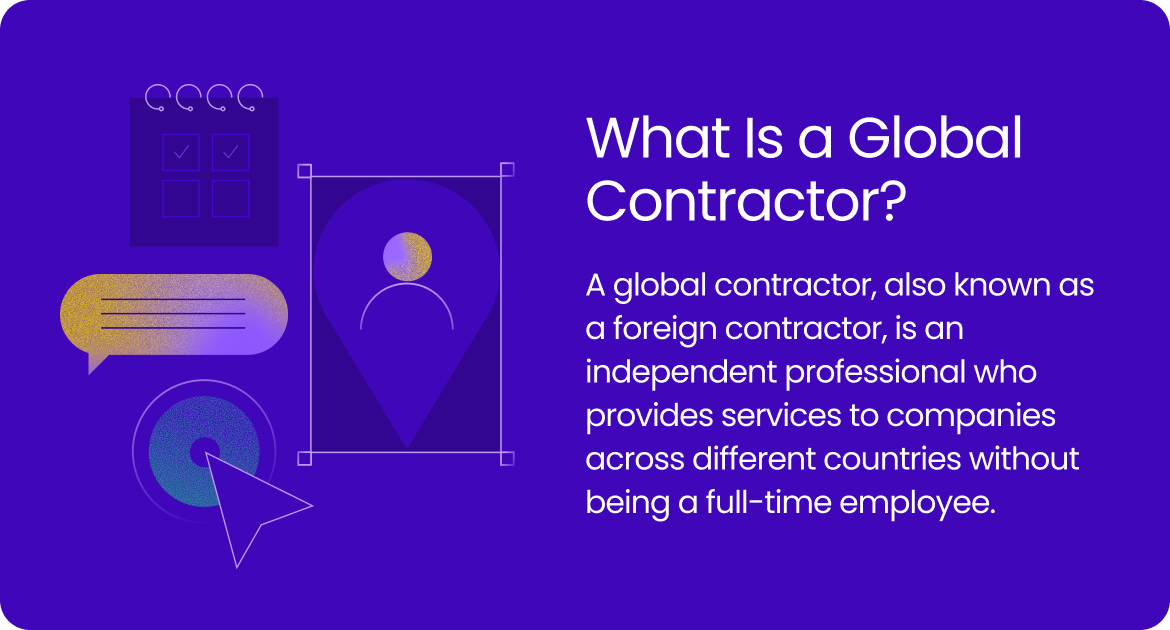As a business owner or human resources manager, you may come across the term "global contractor" in today's interconnected business environment. A global contractor is an independent professional or business that provides services to clients in different countries, often working remotely or traveling as needed. Engaging global contractors allows companies to access specialized skills and expertise beyond their local talent pool, offering flexibility and the ability to scale operations efficiently. This approach enables businesses to operate around the clock by leveraging different time zones and brings high-quality expertise from around the world. Contractors can include freelance designers, remote software developers, marketing consultants, and more.
For example, consider a U.S.-based tech company developing a new software application. To enhance the application's user interface, the company hires a graphic designer based in South Africa as a global contractor. This arrangement enables the company to leverage the designer's unique perspective and skills without the complexities of international employment laws, while the designer benefits from collaborating on a high-profile project. Similarly, a company in the U.S. may hire a software developer from India to work on a specific project due to their specialized skills and cost advantages. Such partnerships can lead to innovative solutions and mutual growth opportunities.

Global Contractors vs Full-Time Employees
Contractors work on a contractual basis, providing services as outlined in their agreements.
They differ from full-time employees in several ways. Contractors are typically hired for specific projects and are not entitled to employee benefits. They have more flexibility over their schedules but also bear the responsibility for their own taxes and insurance. Usually, they are less integrated in your team and company culture.
What are the Benefits Of Hiring a Global Contractor
Hiring international contractors is popular for the following reasons:
- Flexibility in project management: Companies can quickly get the expertise they need for projects, and it offers employers a lot of flexibility. Employers can easily get new projects up and running, without the long onboarding process associated with full time employees, and it’s easier to grow your workforce or scale it back down.
- Cost savings: It can be a more cost-effective hiring solution compared to hiring a full-time employee. Companies don’t have to pay statutory benefits or payroll taxes for contractors.
- Access to global talent: Companies gain access to a global talent pool of experts with specialized skills.
What Are The Risks of Hiring a Global Contractor
There are also drawbacks to consider, such as:
- Miscommunication: Managing different time zones and language or cultural barriers can be challenging, especially since global contractors are not as integrated into your team as a full time employee.
- Navigating compliance with local labor laws: Each country has its own laws that govern how employers should engage employees and contractors. Handling this incorrectly can leave businesses at risk of fines and penalties. For example, treating a contractor like a full time employee can open you up to misclassification risk.
- Limited control: Employers don’t have the same control over contractor schedules as they do with full time employees, which can complicate giving feedback and completing projects.
How to Hire a Contractor Internationally
Every country has its own employment laws that will influence how you hire an international contractor. Common steps in the process include:
- Drawing up a contractor agreement that defines the length of the contract, the payment terms and schedule, and how confidentiality and Intellectual Property will be handled. It should adhere to all relevant local regulations and employment law.
- Fill in all required paperwork, such as the required tax forms in the country – for example, businesses would submit form 1099-NEC for an independent foreign contractor.
- Make sure they are properly classified as contractors during onboarding.
- Decide on your payment method, for example international wire transfer, using digital payment platforms such as PayPal, or use a contractor management solution like Playroll that manages payments as part of the service.
When you use Playroll, you're able to easily hire and manage global contractors:
- Stay compliant with local regulations
- Manage payments and invoices of all your global contractors in one place
- Quick and efficient onboarding for new contractors
For more information, chat to our team of experts about hiring contractors or full time employees in 180+ regions.
Global Contractor FAQs

.png)
Global contractors are typically hired for short-term projects or specific tasks and do not receive the same benefits and protections as full-time employees. Unlike full-time employees, contractors manage their own taxes, insurance, and retirement plans.

.png)
Global contractors are usually paid based on an agreed rate, either hourly, per project, or per milestone. Payments can vary depending on the contractor's location and the method chosen, such as bank transfers, PayPal, or international payment platforms.

.png)
Hiring global contractors offers flexibility, cost savings, and access to a global talent pool without the need to establish local entities. However, there are risks involved, including the potential for misclassification (treating a contractor as an employee), which can lead to legal and financial penalties.
.svg)
.svg)
.svg)
.svg)
.svg)





.svg)




.svg)



















.svg)